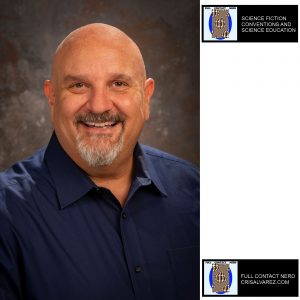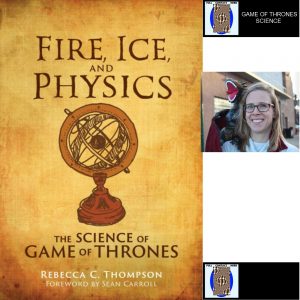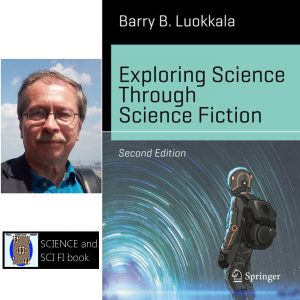Science Education and Sci-Fi Conventions – Dr. Tim Slater interview – FCN Written Interview 1
 The United States is suffering from a deficiency in the number of students pursuing scientific degrees and jobs. There are many reasons for this and a simple google search can provide information on many of the reasons why. The size of the problem might scare some people but there are individuals committed to trying to reverse this trend.
The United States is suffering from a deficiency in the number of students pursuing scientific degrees and jobs. There are many reasons for this and a simple google search can provide information on many of the reasons why. The size of the problem might scare some people but there are individuals committed to trying to reverse this trend.
Dr. Tim Slater is one such individual who recognizes the problem and is making an effort to fix it. Dr. Slater and I discussed the issue and the ways that science fiction, fantasy, and comic books can be helpful in getting more young people interested in studying science.
What is your name and what do you do in the field of science?
My name is Tim Slater and I’m a University professor working on improving the public’s understanding and appreciation of science.
What are some of the current projects you’re working on?
I divide my time into three domains. First, I work on improving the public’s understanding and appreciation of science, mostly through science fiction conventions. Second, I work with college and university science professors helping them become better teachers. Third, I work with graduate students on research uncovering the cognitive mental mechanisms students use when learning to engage in science.
What motivated you to pursue this work as a career? Was there anything in fantasy or science fiction entertainment that inspired your interest in this work? If so what was that inspiration? Did you have a super power or technological device that you wanted to have or use when younger?
Like most kids my age, I was fascinated by stories about space farers—Star Trek, Lost in Space, Star Wars for instance. As I got a little older, I became fascinated, or at least more aware of, the human elements revealed by science fiction—the moral questions about the nature of life in Logan’s Run, the implications of the Prime Directive in Star Trek, and what difficult choices surviving humans might have to make in a post-apocalyptic future.
What have been some of the most exciting discoveries you’ve made in this career field?
For me, the most exciting thing has been being able to measure the dramatic changes in student understanding that occur when professors lecture less, and instead take class time to help students to work with scientific concepts to solve what seem like real-life problems. We’re now extending that to use science fiction scenarios in order to intellectually engage students’ attention and better direct their learning.
Is there anything in science fiction entertainment that you’d like to see more of to generate interest in your field or other science fields?
I’d sure like to see more superheroes and intrepid space farers have to wrestle with moral decisions and implications before they decide to deploy their phasers, photon torpedoes, and blasters. Captain America: Civil War is a really great example of people struggling with authentic moral questions.
Are there any science fiction or fantasy books, movies or television shows that you might recommend and why would you recommend them?
The question of the year is related to Marvel’s Avenger’ Infinity War: Is Thanos morally right in his thinking? Although dated, I think Logan’s Run is perhaps the best introduction to the intersection between envisioning a future and the moral questions brought on by human enterprise. The story line is very easy to immediately identify with. More recently, I think The Orville is probably doing one of the best jobs I’ve seen tackle today’s issues in a science fiction context. In terms of recent books, Robert Sawyer’s Hominid series is a fantastic look at the challenging intersection between science and culture.
Is there anything you’ve seen presented in science fiction that made you felt could have been presented in a more scientifically accurate way and what was that? Multiple examples are fine.
Answering this question could take hours. But, synthesizing what I’ve learned as being most insightful is that most science fiction authors, screen writers, and directors really want to make the situational science accurate—inaccurate science can be really distracting to the audience—BUT, when push comes to shove, never ever let scientific accuracy interfere with telling a great story of the human experience.
A perfect example comes from Andy Weir’s “The Martian.” Heralded by many as being one of the most scientifically accurate stories of the decade—a genre we call ‘hard science fiction’—is motivated by a completely implausible scenario, and openly acknowledged to be so by the author, where Martian winds are strong enough to drive a communications dish through a hardened space suit resulting in a marooned astronaut.
What sort of additional science education outreach might you want to see in general or at science fiction or comic book conventions?
What we’ve learned is that simply pointing out what is scientifically wrong with a science fiction movie scene gets boring quickly. Instead, we’ve found audiences much more interested in using science fiction scenes to motivate the discussion of a scientific concepts illustrated in a particular story, and then talking about where that science really shows up and applies in day-to-day life. In other words, a positive spin rather than a mockingly negative spin.
Do you see a greater interest in science by younger people and do you think any of that is a result of fantasy or science fiction entertainment?
Unfortunately, among American youth, interest and value in science and science career paths are the lowest they have ever been. There are a bunch of reasons for this, and I’m not really interested in pointing fingers, but we are definitely in a crisis that has globally economic implications that is largely being ignored. Not that lots of federal money isn’t being thrown at the issue, but it is mostly political theater rather than really trying to actually solve our science career pipeline problems. The actual details of that failure are highly politically incorrect: The problems are actually solvable, but not in the current ideologically driven anti-social climate of identity politics that pervades the US today.
Author Biography
Dr. Tim Slater is an internationally respected scholar in higher education. Formally trained as an astronomer, he is currently the Editor-in-Chief of the Journal of Astronomy & Earth Sciences Education, has co-authored more than 25 books, serves as the Senior Internet Blogger for the Society of College Science Teachers, has been awarded nearly $30 million dollars in grants, and has more than 100 peer-reviewed scientific articles with more than 2,000 citations. He is the University of Wyoming Excellence in Higher Education Endowed Professor and a Senior Scientist at the international CAPER Center for Astronomy & Physics Education Research. Known widely as the “Professors’ Professor” Dr. Slater has provided workshops on innovative teaching and successful career management to thousands of college and university professors worldwide.
Dr. Tim Slater
University of Wyoming Excellence in Higher Education Endowed Professor of Science Education
University of Wyoming
Subject being discussed: Capitalizing on Science Fiction Conventions to Teach Science

